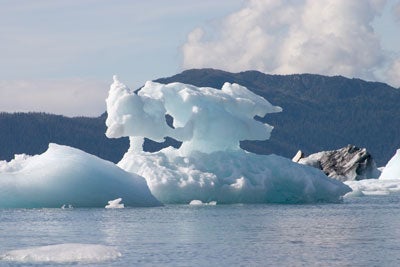The United States Coast Guard is being left behind in the Arctic. While countries such as Russia are building up their icebreaker fleet and actively increasing their presence in the Arctic, the United States is losing its only form of sovereignty in the region.
On December 1, Rear Admiral Jeffrey M. Garrett, U.S. Coast Guard, testified before Congress on protecting U.S. sovereignty in the Arctic. He stated in Second Line of Defense that “the Icebreaker fleet represents the main surface presence that the U.S. can exert in what is essentially a maritime domain in the Arctic Ocean.” Yet today, the Coast Guard has an icebreaker fleet of only three ships. Worse yet, two of these ships are out of commission due to maintenance work and will not be available for at least seven more years.
The lone icebreaker in commission is the USCGC Healy, which conducts all types of missions from search and rescue to navigational aid to scientific research. Though the ship has been effective at its job in the Arctic, it is designed to break through ice of only medium thickness; for ice of heavy thickness, the Healy is absolutely useless. And like the other two icebreakers, it is quickly aging.
Without efforts to modernize the fleet, the future of the U.S. national maritime interest and security in the Arctic is looking pretty bleak. Icebreakers are a necessity in the region, and without them the U.S. might as well throw in the towel. These ships are key to year-round access to the Arctic and are the only U.S. insurance policy for future hazardous events. If something happens to the Healy, then the United States would not only lose access to the region but would not be able to react to potential oil spills and would become less effective in search-and-rescue missions.
Complicating matters even further, ice in the Arctic is melting, producing more ocean area for the transportation of goods and services in the region. Essentially, whoever best utilizes this route will control trade and transportation of goods and materials in the upper hemisphere. With all other nations around the Arctic building their icebreaker fleets and exploiting the key transportation route that connects the Atlantic and Pacific Oceans, the United States is falling behind.
In order to create an icebreaking fleet to maintain U.S. presence in the region, the Administration should look toward privatizing the fleet. Allowing private companies to own and operate the U.S. icebreaking fleet and perform national security functions would not only allow for crucial modernization but also save federal dollars and expand U.S. capabilities in the Arctic. This is particularly important at a time when the government is looking to cut corners in federal spending.
Ultimately, something must be done. If the U.S. does not act fast, it will come in last in the race for the Arctic.
Tyler Davis is currently a member of the Young Leaders Program at The Heritage Foundation. For more information on interning at Heritage, please visit: http://www.heritage.org/about/departments/ylp.cfm
